The Best Cloud Inventory Software
Cloud inventory software allows businesses, from distributors to eCommerce sellers, to integrate with third-party systems and access their data from anywhere. We evaluated the top platforms for companies of all sizes to help you find the best fit.
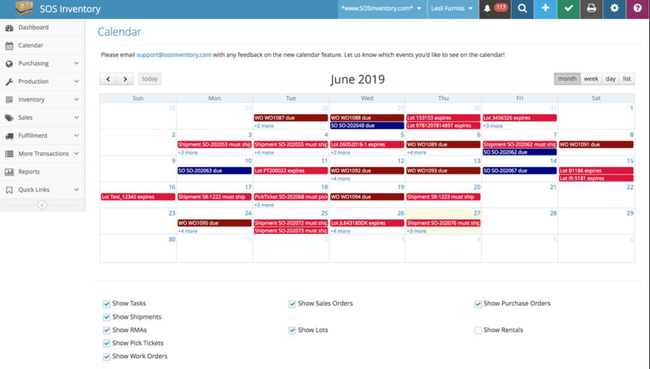
- Integrates with QuickBooks Online, ShipStation, and Shopify
- Affordable pricing for SMBs
- Mobile app for warehouse inventory management
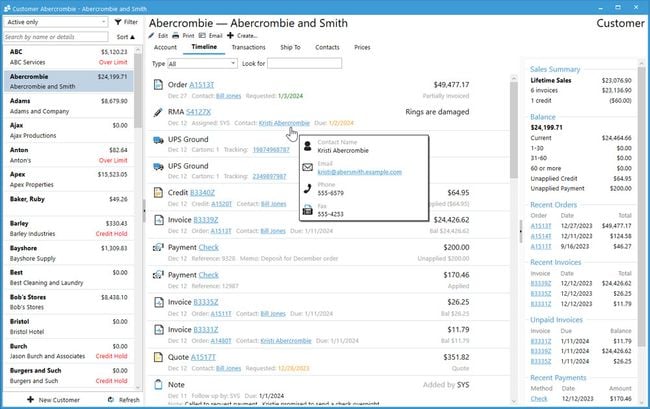
- Provides batch tools through the order manager to track process workflows
- Integrates directly with QuickBooks for easy data migration
- Can handle millions of SKUs for scalability
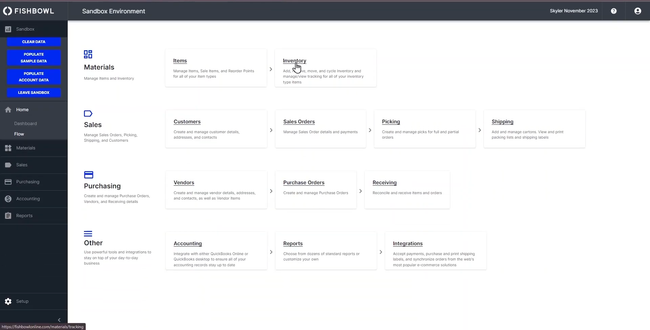
- Competitive pricing; does not require a subscription
- Integrates with QuickBooks
- Can function as a light MRP system
Inventory management is the process of controlling products throughout the supply chain from manufacturer to final seller.
We’ve conducted in-depth industry research on the best cloud inventory software using our advanced review methodology. Our top picks are based on ranking factors like value for money, integration options, and features like audit management and traceability tools.
- SOS Inventory: Best Overall
- Acctivate: Best for Food & Beverage Distributors
- Fishbowl Inventory: Best Integration Options
- inFlow Inventory: Best for Small Businesses
- Finale Inventory: Best for Multi-Channel eCommerce
- Cin7 Core: Best Reporting Capabilities
- Zoho Inventory: Best Free Plan
- Sortly: Best Mobile Capabilities
SOS Inventory - Best Overall
SOS Inventory’s inventory costing module makes it a strong option for small to midsize businesses in multiple industries, such as distribution and manufacturing. The user-friendly interface enables easy navigation, as most actions, like viewing your cost of goods sold, can be performed without switching screens or modules. It supports multiple costing methods, including:
- FIFO: The first in first out method is the most common, and assumes the first items acquired will be sold first. This is especially useful for process manufacturers dealing with perishable goods.
- LIFO: The last in first out strategy assumes the last items you acquire are sold first.
- Weighted average: This calculates the average cost of all inventory items. This is the most simple form of inventory valuation and helps reduce the impact of price changes in certain items.
When you implement SOS Inventory, you can select any of the three methods. You can even switch between them without affecting historical transactions, so you’re not bound to any one system. The module automatically tracks costs and quantities at all stages, from raw materials to finished goods. It updates all prices in real-time, letting you monitor fluctuating costs so you’re always viewing accurate data.
SOS Inventory is affordable for small to midsize businesses with 5-50 employees. Pricing starts at $64.95/month for 2 users. However, the job costing feature is only available on the Pro plan at $179.95/month.
Acctivate - Best for Food & Beverage Distributors
Acctivate offers lot tracking and traceability for better food safety compliance. The system recognizes lot numbers when inventory is received, shipped, or both. This helps keep batches of goods created on the same day or in the same conditions together in case the batch is faulty. In the event of a recall, all assigned codes are stored in the system. You can easily look up the specific lot number or assigned customer for streamlined tracking of all supplies used and items produced.
Acctivate’s traceability tools can help food and beverage distributors comply with strict regulations. Primarily, companies must adhere to the Food and Safety Modernization Act (FSMA) section 204. This requires distributors of high-risk food to maintain thorough records of all products. Violations can result in suspended facility registration or even criminal penalties. By having detailed lot tracking, you can organize all information for easy reference and follow regulations.
Acctivate’s pricing starts at $5,000/year with a $5,995 one-time initial license fee. This makes it an effective option for midsize distributors who outgrow more basic systems like Zoho Inventory but aren’t ready for a full ERP system like Acumatica.
Fishbowl Inventory - Best Integration Options
Fishbowl Inventory helps companies with multiple software systems unify inventory with other business processes. It connects with dozens of platforms, including accounting systems like QuickBooks and Xero, eCommerce systems like WooCommerce and Shopify, and shipping providers like UPS and FedEx.
It’s great for companies that need to centralize inventory but aren’t ready to make the leap to a full ERP platform. Instead, it serves as a lightweight MRP and inventory control hub that plugs into your current tech stack. It manages purchasing, warehouse management, work orders, and fulfilment without replacing other systems you might already use. It includes standard inventory features like barcode and serial tracking, along with more advanced features like BOM management and multi-level work orders.
While Fishbowl’s pricing isn’t publicly listed, plans typically start around $3,200/year for basic features and two users. Integration options start at $50/month or may be included depending on the package selected. For the most up-to-date pricing, it’s best to request a custom quote from Fishbowl.
inFlow Inventory - Best for Small Businesses
inFlow Inventory is a good first step for SMBs transitioning from spreadsheets and manual processes to a cloud-based, integrated system. Its inventory management tools span purchase order management, sales order processing, real-time tracking, and detailed reporting. Additionally, inFlow supports barcode scanning, multi-location management, and a customizable dashboard with personalized overviews of business metrics.
We found inFlow’s pricing structure fairly flexible, with multiple tiers catering to different business sizes and needs. Its sales and order management system is also a highlight, consolidating sales orders, customer info, invoicing, and payments in one platform. Finally, the B2B portal feature adds appeal for wholesale and distribution businesses, allowing clients to place online orders anytime and anywhere through the cloud.
Finale Inventory - Best for Multi-Channel eCommerce
We found Finale Inventory best suited to businesses that operate across two or more online sales channels. That’s because the software integrates well with multiple eCommerce platforms, including Amazon, eBay, Etsy, Newegg, and TikTok Shop. Moreover, it has over 50 integrations with accounting systems, POS, EDI, and more, providing a versatile tool for managing complex inventory requirements.
Finale Inventory’s cloud-based platform ensures data accessibility from anywhere, facilitating real-time inventory tracking and management. Its compatibility with Android mobile devices and barcode scanners further enhances the system’s flexibility. Features like product lookups, transfers, purchase orders, and invoicing, paired with QuickBooks integration, streamline accounting and inventory control for retailers operating in several marketplaces.
Cin7 Core - Best Reporting Capabilities
We recommend Cin7 Core to companies that want to get a handle on their reporting for strategic business decisions and operational improvements. This software comes with over 70 customizable reports on sales, purchases, financial data, production, and inventory. Beyond reporting, Cin7 Core delivers real-time inventory insights, handling purchase orders, storage, production, multi-channel sales and fulfillment, and returns from a single platform.
Growing companies with plans to operate in various marketplaces and online channels should also consider Cin7 Core. The ability to manage an unlimited number of SKUs and orders, along with three scalable pricing plans, ensures this platform evolves alongside businesses.
Zoho Inventory - Best Free Plan
Startups and companies with one warehouse will likely find Zoho Inventory’s free plan sufficient to get them up and running. It supports one warehouse, one user, and 50 orders per month. It’s a decent choice for smaller retailers, along with basic multi-currency handling, a customer portal, and eCommerce integrations.
As businesses grow, they can invest in one of Zoho Inventory’s paid plans for multi-warehouse support, serial number tracking, a vendor portal, and batch tracking. Scaling companies can build a custom system using a wide variety of Zoho add-ons and modules, like Zoho Books for accounting and Zoho CRM.
Sortly - Best Mobile Capabilities
Sortly is one of the more visually intuitive inventory management systems out there, with an easy-to-use mobile app. Sortly’s mobile-first approach means users can conduct inventory updates and checks on the go. The mobile app also supports barcode and QR scanning, label generation, and offline access, ensuring inventory data is always accurate and up-to-date.
Beyond mobile capabilities, Sortly allows users to organize their inventory with custom folders, tags, and item photos. This is useful for businesses with extensive inventory items, where visual cues simplify identification and tracking. Finally, Sortly’s proactive system automates low stock and date-based alerts to help minimize stockouts and overstocking.
What is Cloud Inventory Software?
Cloud inventory software is a web-based version of inventory management solution designed to track and manage a company’s product inventory online. Cloud-based inventory management systems simplify effective stock-level practices by making the information accessible at all times.
In essence, cloud inventory software lets companies know where products are in the supply chain in real time. You can access the cloud platform anywhere from any web browser or mobile app. With instant access to your online inventory system, you can make changes and monitor your inventory from anywhere at any time. While cloud inventory management is particularly popular with eCommerce, these systems are compatible with all types of businesses.
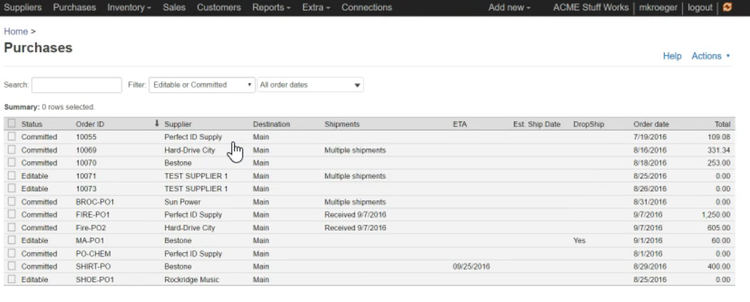
Key Features
- Inventory costing: Establish the cost value of inventory for maximum profitability by tracking and calculating tax accounting in real-time (cost methods include: FIFO, LIFO, average costing, and others).
- Location tracking: Aids in picking/packing/shipping tasks related to inventory items and helps improve inventory loss prevention.
- Stock count tracking: Provides a record of the on-hand units for each SKU and helps maintain accurate stock levels.
- Traceability: Barcode scanning technology, Radio Frequency Identification (RFID) readers, and lot/serial numbers make it easy to track where products are at all times during shipping
- FIFO/LIFO compliance: Ensure perishable products are sold based on factors like first in, first out (FIFO) or last in, first out (LIFO)
- Price management: Change price info for products, such as offering specific sales or discounts
- Audit management: Check inventory records against actual item level counts to prevent shortages or overstock
- Order history: Track customer orders, identify sales patterns, and anticipate future sales
- Replenishment thresholds: Set automated reorder points to indicate when stock is too low and needs replenishment
Primary Benefits
Cloud-based inventory management offers a lot of benefits to businesses:
Instant Access Anywhere
The main benefit of cloud inventory software is the ability to manage stock levels from anywhere in the world. Simply log in from any computer or mobile device to get real-time updates on what’s in stock and what needs to be re-ordered. Even employees on the road visiting manufacturers or warehouses can provide instant updates based on new information.
Using a cloud-based inventory management system means greater coordination between all parts of the supply chain. A supplier can directly inform manufacturers of material shortages, allowing the seller to prepare for potential delays. Additionally, inventory management solutions use tracking methods to record the precise location of products stored in warehouses, so you always find additional stock promptly. If a product is out of stock with a retailer, you can immediately rectify the situation and keep customers happy.
Automate Inventory Processes
Human error is inevitable, especially in highly repetitive, time-consuming tasks such as manually counting inventory. Fortunately, cloud inventory control solutions offer a variety of tools for automating time-intensive tasks related to keeping track of stock. With additional automation, you can streamline your workflow to prevent stock-outs.
Both barcoding and RFID scanning can dramatically speed up inventory processes by removing the need to manually enter in product data. Automated storage and retrieval systems (AS/RS) help move products through warehouses and shipping facilities by using machinery. These combined factors dramatically increase the efficiency of taking inventory and directing products to the right end destinations.
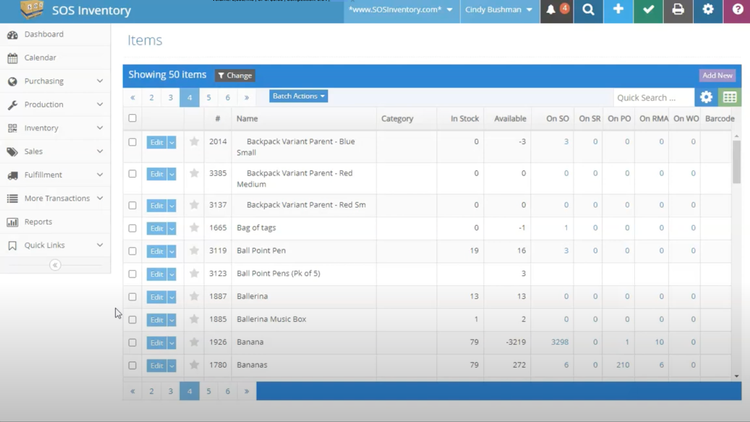
Secure Your Data
Cloud inventory management software provides backups to your valuable data while keeping it accessible. Traditional inventory management systems might be unable to duplicate and store data easily. Integrating your cloud inventory software with an enterprise resource planning (ERP) system can further improve your data storage.
Additionally, this historical data can be used for long-term business analytics. Compare purchase orders based on custom metrics. Determine how your supply chain is performing, calculate which products have the best sales, and other ways you can improve your profitability.
Managing Your Products Accurately
Cloud inventory software also prevents product miscounts by allowing real-time supply chain updates. In turn, this leads to greater demand planning and forecasting accuracy. You can account for sudden increases in demand without the delays caused by traditional inventory management practices.
Since everyone can access cloud-based inventory management systems with basic Internet access, anyone in your company can double-check stock availability. Adding more safeguards and visibility to your inventory count process prevents miscounts and miscommunication.
Maintaining the right amount of stock is critical to meeting customer demands. A cloud-based platform that tracks order history determines which products are selling and which are not. And analytics tools are available to generate demand and sales reports. By understanding immediate sales trends, you can adjust your stock levels accordingly.
Common Pain Points
Traditional inventory management solutions have several flaws that a cloud-based system can overcome:
- Delayed data analysis: Tracking inventory from production to the consumer takes time. Identifying sales patterns as soon as possible is vital for staying ahead of customer demand. Cloud inventory software provides real-time data visibility, which can be immediately analyzed.
- Limited growth: Inventory management software is often priced based on the scale of your company. If you operate a small business, this might limit your options. If your business needs change, you’ll have to pay more to increase the scope of your software. Fortunately, cloud-based platforms provide scalability for growing businesses.
- Miscommunications: The multi-echelon supply chain involves many moving parts. All it takes is one mistake to cause delays. Cloud inventory software provides a user-friendly method for manufacturers, distributors, warehouses, retailers, and others to coordinate their communication about production.
- Product shortages: Of course, all these possible delays can lead to product shortages. If this happens, customers will be left empty-handed and unhappy with your services. Keeping track of inventory with a cloud-based system can prevent this from occurring in the first place.
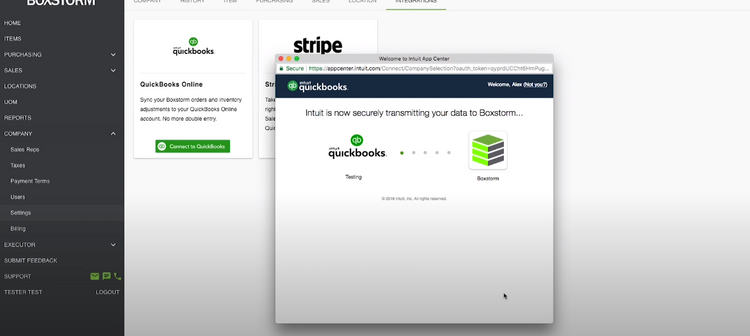
Pricing Guide
Cloud inventory software typically costs between $100/month and over $3,000/month, depending on company size, required features, and user count. Pricing generally scales with the complexity of your operations, such as the number of warehouses, SKUs, and required integrations with other systems.
Because these systems are hosted in the cloud, most solutions use subscription-based pricing, billed monthly or annually. This typically covers hosting, updates, and ongoing support. Self-hosted systems are rare for cloud and are usually only offered by legacy vendors.
| Plan | Annual Cost | Included Features | Example Products |
|---|---|---|---|
| Entry (1–5 users) | $1,500 – $10,000/year | Basic inventory control, barcode scanning, purchasing, single-warehouse, minimal integrations | Zoho Inventory, SOS Inventory, Cin7 Core, Ordoro |
| Mid-Sized (5-25 users) | $10,000 – $50,000/year | Advanced inventory, light manufacturing, lot/serial tracking, B2B portals, moderate integrations | Acctivate, Fishbowl, Finale Inventory, Cin7 Omni, TradeGecko |
| Advanced (25–100 users) | $50,000 – $100,000/year | Warehouse automation, demand planning, customizable workflows, high-volume order management | NetSuite WMS, Dynamics 365 SCM, Infor CloudSuite, Manhattan Active |
| Enterprise (100+ users) | $150,000+/year | Enterprise-grade WMS, global operations, predictive analytics, deep ERP/SCM integrations | SAP EWM, Oracle Fusion SCM, Blue Yonder Luminate, Manhattan WMS |
Is There Free Inventory Software?
While some vendors like Zoho Inventory offer free or “freemium” software plans, these are typically limited in functionality, supporting only one user, a single inventory location, or a capped number of orders per month. They may be suitable for testing or training, but most businesses quickly outgrow even the most basic plans. For serious operational use, even small companies should plan on investing in a paid inventory system.
Frequently Asked Questions
What is SaaS inventory management software?
What does cloud inventory management software do?
How do you implement an inventory management system?
Implementing an inventory management system typically involves several steps:
- Assessing current inventory processes and needs.
- Choosing the right software solution that fits those needs.
- Configuring the software to match your inventory structure and workflows.
- Importing existing inventory data into the system.
- Training staff on how to use the new system effectively.
- Regularly reviewing and optimizing the system.













































